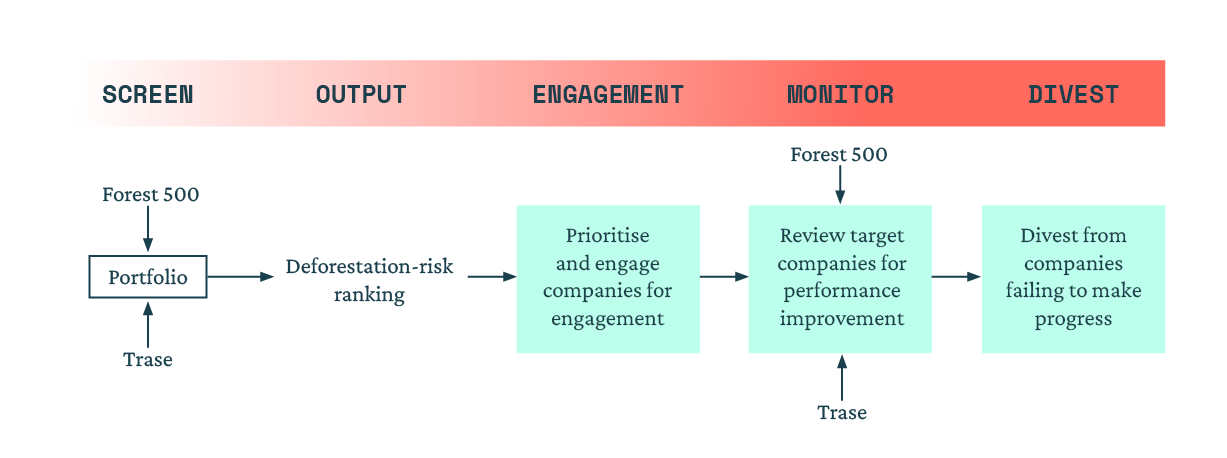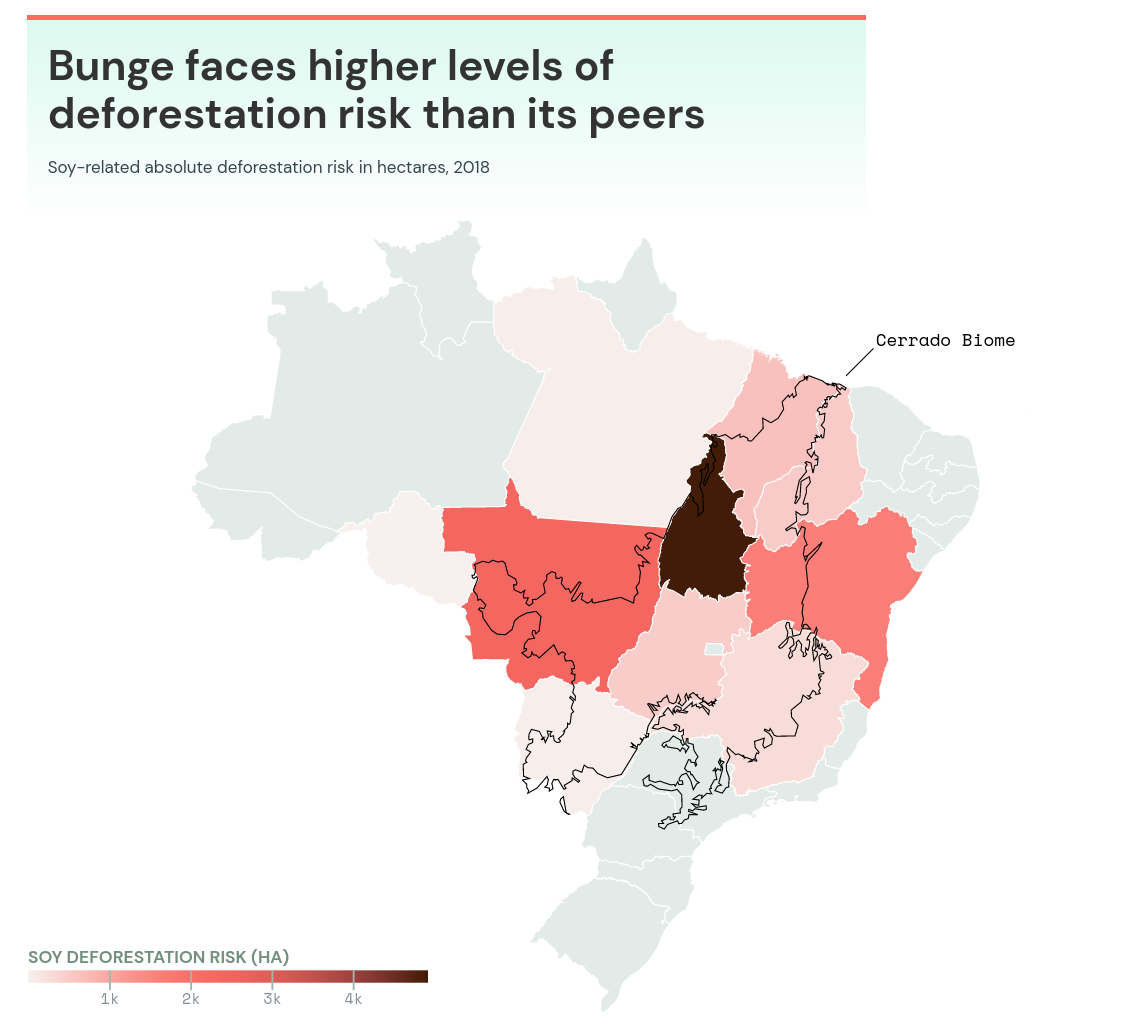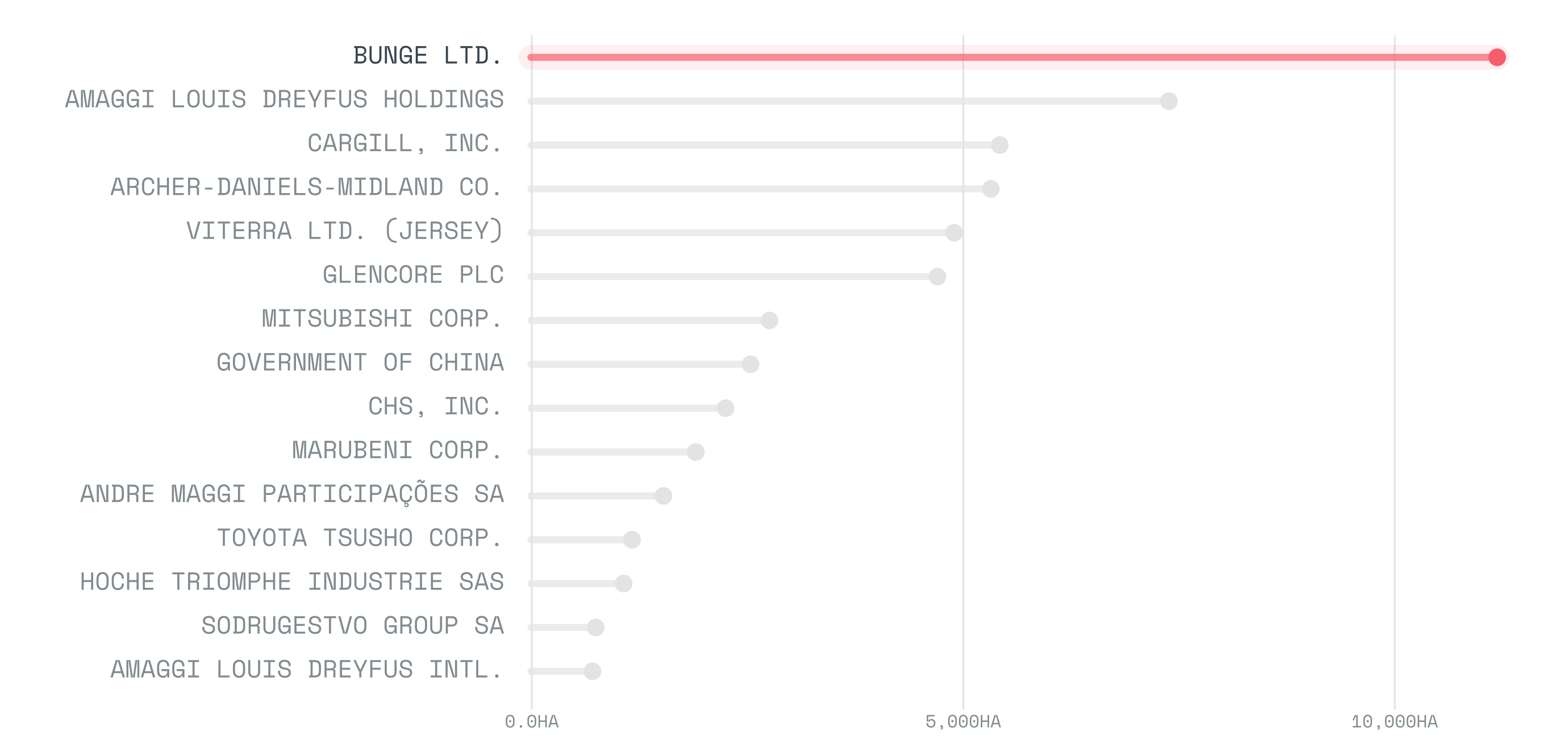Many companies depend on nature and the ecosystem services that it provides. It is estimated that nearly half of all economic activity is moderately or highly dependent on nature - around $44trn of global GDP. Yet we continue to live in a way that exceeds the limits of the Earth’s natural systems, threatening future prosperity and creating financial risks for investors.
In particular, tropical deforestation, carried out to clear land for agricultural production, is a significant driver of biodiversity loss, altered rainfall patterns and climate change. It is estimated that up to 13% of all human greenhouse gas emissions originate from deforestation, meaning that we can not tackle the climate emergency without tackling deforestation.
The impacts of land use change from agriculture may create a number of risks for soft-commodity producers and traders:
- Operational risks from continued land clearance
- Market access loss and competitive risk
- Constrained access to capital
- Reputational damage
The complexity of agricultural production and supply chains creates a barrier to more effective investor action. Commodities such as cattle, soy and palm oil are being sourced from land recently converted both legally and illegally, but investors are often unaware of these links and how they are consequently financing climate change and biodiversity loss.
Empowering portfolio analysis
Trase worked with Storebrand Asset Management to demonstrate how its data can help investors overcome this barrier by identifying links between portfolio companies and soft commodity-driven tropical deforestation.
Our aim is to leverage the leading investor stewardship shown by Storebrand to provide guidance that can support other investors looking to identify and remove tropical deforestation from their portfolios and to demonstrate their contribution to reductions in biodiversity loss and climate change.

Vemund Olsen
Deforestation commitment
Storebrand’s ambition is to have an investment portfolio that does not contribute to deforestation by 2025. Storebrand will not knowingly finance operations that are illegal, fail to protect high conservation value forests/land, or violate the rights of workers and local people. Storebrand commits to:
- use the tools that, as shareholders, they have at their disposal to induce companies to meet these ambitions;
- cooperate with other financial institutions to promote standards for measuring, monitoring and reporting on direct and indirect deforestation risk; and
- encourage companies to disclose information on deforestation.
In 2020 Storebrand mapped its portfolio exposure to deforestation risk and plans to report annually on progress towards its 2025 target. It also assesses whether company management is taking relevant steps to develop a long-term business strategy to avoid deforestation and tackle climate change.
Data to assess deforestation risk in portfolios
In the absence of comprehensive data on deforestation by financial data providers, Storebrand developed an approach using two monitoring and assessment tools, Trase developed by the Stockholm Environment Institute, Global Canopy and Neural Alpha, and Forest 500 by Global Canopy.
Forest 500 identifies and ranks the most influential companies and financial institutions in forest-risk commodity supply chains. The results indicate shortcomings and gaps in these companies’ commitments, highlighting where greater action is required to achieve more robust deforestation commitments and transparency in their implementation.
Trase estimates deforestation impact associated with soft commodity producers and traders in high deforestation-risk commodity supply chains by bringing together disparate, publicly available data to connect consumer markets to deforestation and other impacts on the ground. Trase data draws upon satellite data for deforestation, infrastructure maps and commodity trade and taxation data, linking supply chain companies to places of production at scale for entire soft commodity export markets.
Trase Finance builds on Trase deforestation-risk data by mapping detailed corporate ownership structures of soft commodity trading companies as well as the financial flows to separate legal entities within them. Trase Finance provides enhanced transparency for the indirect links to deforestation risks for financial institutions through their investments in and lending to other financial institutions and supply chain companies.

Storebrand uses Forest 500 and Trase data to inform its engagement activities
Company screening for direct engagement
Storebrand has a robust and proactive approach to investor stewardship, arranging direct and collective engagement with investee companies as well as implementing proxy voting measures.
Storebrand selected companies in its portfolio for direct engagement using scores from Global Canopy’s Forest 500 assessment to categorise companies into three groups: green, yellow and red.
Green: Companies that score over 80 points in the Forest 500 ranking or (through active engagement or other documentation) have demonstrated compliance with Storebrand's deforestation policy.
Yellow: Companies that score 80-40 points in the Forest 500.
Red: Companies that score below 40 points in the Forest 500 (or have been unwilling to make necessary improvements suggested through active engagement).
Storebrand identified 40 investee companies in the red category to be engaged directly. Storebrand continues to encourage these companies to demonstrate a commitment to eliminating deforestation from their production and supply chains.
Storebrand requires companies that are classified in the red zone to take the following steps:
- Stronger awareness and governance regarding deforestation risks, including oversight at the board of directors level.
- A publicly disclosed commodity-specific deforestation policy with quantifiable, time bound commitments covering the entire supply chain and sourcing geographies.
- Traceability across the entire commodities supply chain.
- Monitoring and verification processes to ensure that suppliers are complying with the company’s deforestation policy.
Supporting the assessment of red zone companies, Trase data is used to further drill down and identify deforestation risk as measured in hectares of deforestation. Trase Finance provides a list of the top 10 soft commodity trading companies by commodity, country and deforestation risk. Storebrand then mapped the highest risk companies to their portfolios to identify both:
- Companies that score well for policies and commitments, but are linked to persistent and high deforestation risks as per Trase data.
- Companies with high deforestation risk as measured by Trase, but that also have a low score for policies and commitments.
Collective engagement through shareholder action
In addition to direct company engagement, Storebrand also carries out collective engagement through participation within the UN Principles for Responsible Investment (UNPRI) investor group on palm oil and the sustainable forests investor group. Storebrand will also continue to support investor resolutions, filed by other investors, with soft commodity trading companies.
Storebrand uses proxy voting to exert extra influence over companies they are engaging with or to signal the importance of sustainability issues. Filing of shareholder resolutions can also be considered if the company is not responsive to making necessary improvements in its policies.
In 2021, Storebrand co-filed a shareholder resolution with Green Century Capital Management at Bunge's AGM, requesting that the company improves its implementation of its zero-deforestation policy, including adopting a cut-off date and developing a comprehensive non-compliance protocol.
The shareholder resolution set out the case for the potentially material nature of risks associated with the degradation of natural systems in the regions from which Bunge sources soy.
Strengthening the analysis was the use of Trase supply chain data that linked Bunge to soy production where deforestation continues. Trase was able to provide a quantitative risk estimate for deforestation (measured in hectares) in aggregate and also a measure of disaggregated sourcing to the state level for all of Bunge’s exports of soy from Brazil. Trase is able to supply more detailed municipality-level data where needed.

Bunge is exposed to significant levels of deforestation risk in Brazil (Soy sourced by state, 2018). Source: Trase Finance
In addition, Trase data established that Bunge’s deforestation risk linked to the Cerrado biome of Brazil is 51% higher than its nearest competitor, despite the company’s zero-deforestation commitments. For the purposes of this shareholder resolution, a measure of deforestation risk measured in hectares was used, but Trase Finance is also able to provide a relative measure of deforestation risk, adjusting attributed deforestation for total volumes of commodity sourced. Peer group rankings on a relative measure are available on the Trase Finance system.

Bunge faces higher levels of deforestation risk than its peers (soy-related deforestation risk in hectares, 2018). Source: Trase Finance
Storebrand also assessed portfolios for holdings in financial institutions with indirect exposure to deforestation via their lending and investment in soft commodity supply chain companies. Trase Finance maps the flows of finance to supply chain companies allowing investors to identify indirect deforestation risks associated with the provision of finance.
Investor benefits
Storebrand’s use of Forest 500 and Trase data shows its ability to support investor decision making by:
- Enabling investors to apply a fast and effective quantitative screen to portfolios, assessing companies on a standardised and comparable basis to identify deforestation risk companies.
- Allowing investors to rank and compare companies across geographies and commodities.
- Comparing company performance on policies and commitments as well as attributed deforestation risk to identify priority companies for engagement.
- Allowing investors to access additional contextual information at the company level with Trase Finance providing additional subsidiary-level information to support engagement planning and to help target specific aspects of governance and commodity sourcing.
- Providing data that is free to access with a team of experts on hand to support investors with training, data uptake and integration.
Unsustainable soft commodity production continues to be a driver of tropical deforestation and by extension climate change and biodiversity loss. Solutions to this problem are urgently needed, but are hampered by a lack of transparency across complex soft commodity supply chains.
Despite these challenges, the actions of investors like Storebrand show that there are simple and effective steps that investors can deploy now to identify deforestation risks in their portfolios and to engage high-risk companies as a first step to signalling the requirement for improved performance.
Investors have a critical role to play in redirecting investment and finance towards sustainable business activities. The transition from unsustainable to sustainable production not only reduces deforestation-related risks, but also presents significant opportunities for investors. To support financial institutions, Trase will be producing a series of case studies showcasing practical and implementable measures on how financial institutions are managing deforestation risk and developing new green finance products to fund the transition to zero deforestation.
Was this article useful?



